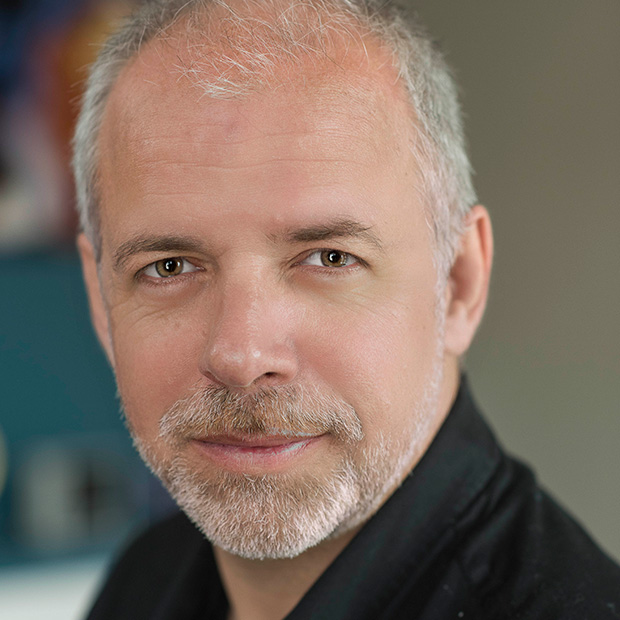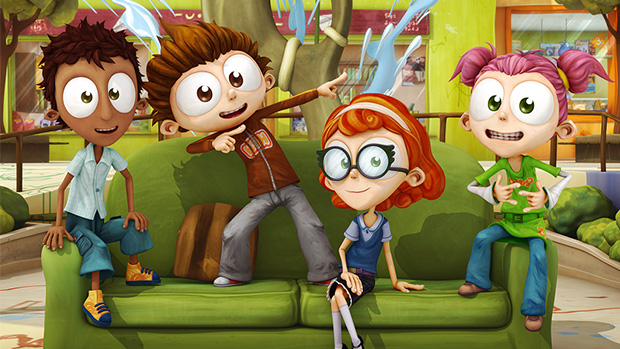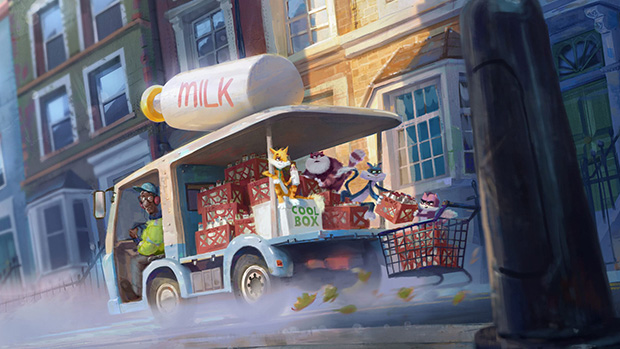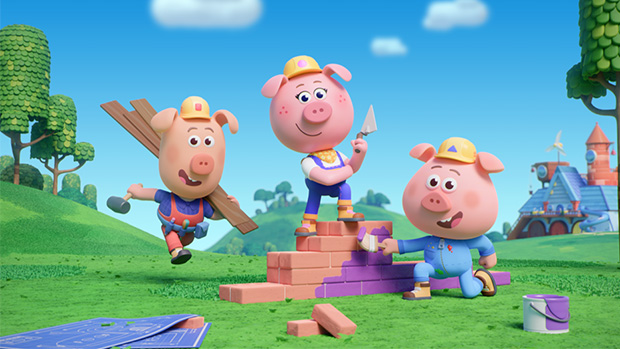Hollywood woes disrupt France's recipe for success
Cancelled projects and a sudden reduction in orders from the US streamers have rocked the world-renowned French animation sector, with some of its biggest players feeling the effects.

Marc du Pontavice
Let’s imagine the French animation industry as a giant gâteau, one that over the decades has grown ever bigger, richer and more delicious due to ingredients such as hefty and reliable tax credits, lashings of public funding and irresistible local production investment quotas guaranteeing a recipe for success.
The streaming wars, and the subsequent uptick in service work from major US players such as Netflix that it generated, provided the icing on this cake, with some of France’s top animation studios being tapped to satisfy the streamers’ seemingly insatiable appetite for new content.
But as we all know, Hollywood is on a diet right now and we’re not just talking about Ozempic.
The recent, drastic pullback from original commissioning at US streamers has hit the French animation market hard, with a sharp drop in lucrative high-end animation service work contracts, some of which have been cancelled at the last minute, causing a nightmare in the kitchen/animation studio (I’ll pause the cake analogy for now).
Xilam and TeamTO, two of France’s biggest animation studios, are among the major French animation studios to have scaled back their operations after expected work-for-hire opportunities with US streamers failed to materialise, C21 revealed last week.
Xilam, ranked as France’s leading animation studio between 2018 and 2022 in a report by the Centre National du Cinéma et de l’Image Animée, closed its animation studio in Lyon, where up to 70 people were employed, earlier this year.

Angelo Rules producer TeamTO has reduced its headcount from 400 to between 150 and 200
Angelo Rules producer TeamTO, meanwhile, has reduced its headcount from 400 at its peak to between 150 and 200 people across its studios in Paris and Valence, with Guillaume Hellouin, president and CEO, citing a “serious reduction in service work that we expected to do in 2023 that did not happen.”
Netflix and its fellow US streamers and studios have significantly tightened their purse strings over the past 18 months, commissioning fewer titles and even cancelling previously announced European projects.
These include an as-yet-untitled animated feature film from Oscar-winning filmmaker Steve Box (Wallace & Gromit: The Curse of the Were Rabbit). Paris-based Superprod Animation had begun staffing up to produce the film before it was abruptly cancelled by Netflix due to creative problems, according to a source close to the project. C21 understands Superprod, which declined to comment, can shop the film to potential new buyers.
While it is common for animation companies to scale up and down as projects come and go, the downsizing seen at numerous French studios so far in 2024 highlights how work-for-hire contracts from Hollywood during the streaming boom had led to some studios potentially over-extending themselves.
The uptick in demand required a sharp increase in studio space, with Xilam opening its now-shuttered Lyon production facility in 2016, alongside a studio in Angoulême for 50 people and its Paris HQ, where it employs 150 staff. It also operates a studio in Ho Chi Minh City in Vietnam, where 140 people work, according to its website.

Oscar-winning filmmaker Steve Box has had an animated feature cancelled recently
TeamTO expanded its studio in Valence in 2016, buoyed by its first piece of service work for a global streamer after Netflix chose it to produce its big budget Skylanders Academy series. After animation production surged during the Covid-19 pandemic, TeamTO relocated to a larger and more environmentally sustainable studio in Paris in late 2022.
France’s animation industry has been one of the European audiovisual sector’s great success stories in recent decades and growth has been incentivised by the French government, which revamped the local funding system for animation in 2016, leading to a flurry of studio openings in areas such as Lille and Angoulême and a scramble for animation talent.
The situation has changed dramatically, however, in the aftermath of the pandemic. Xilam, for example, has seen its share price on the Paris stock exchange drop dramatically since August 2022, from €41 (US$47) per share to €4.40 at the time of writing.
The Oggy & the Cockroaches producer warned in its annual report for 2023 in February that “reduced investment in the children’s segment by major streaming platforms during the second half of 2023 will substantially decrease revenue in 2024.”
But Marc du Pontavice, founder and CEO at Xilam Animation, emphasises the foundations of his company, and by extension the French animation industry overall, are built on IP, rather than service work, and points to long-running Xilam brands such Oggy – which graced the cover of the first ever edition of Channel 21 International magazine back in September 1997.
The animation veteran told C21: “The market is indeed experiencing a dramatic slow down and Xilam is no exception in this context. Nonetheless, Xilam’s business model has always relied more on the IP business rather than servicing work, thanks to its powerful creative organisation – so we find ourselves in a strong position to overcome this downturn and are actively executing new strategies to mitigate against the impact.”

Piggy Builders was commissioned by France Télévisions, BBC in the UK and ZDF in Germany
These include generating revenue from its library on AVoD, while it currently has six series in production, including horror comedy series Doomies, which it created and produced for Disney+. It also recently had CG preschool series Piggy Builders commissioned by France Télévisions (FTV), BBC in the UK and ZDF in Germany, while the adult animation market, which Xilam has been making significant in-roads into, “seems to be resisting the commissioning slowdown and offers promising growth prospects,” according to du Pontavice.
“2024 is certainly a year of transition which is not without challenges, but we will be drawing on the breadth of our content offering, diversity of our clients as well as the creativity and expertise of our teams to ensure we keep ourselves future proofed for the long-term,” the exec adds.
Hellouin adds: “The challenges the industry is facing in France are not just in France. They are worldwide. They have the same problem in Canada, with significant reductions.
“All the streamers were racing to get market share, investing like crazy, until everything collapsed last year. The market has restructured and we’re hoping the next six months of 2024 will see it recover. But the market will never come back to what it was in 2021 and 2022, that’s for sure.”
But Hellouin is quick to point out though TeamTO may have downsized, it remains busy with its current projects and developing new shows. Its hit series Angelo Rules has just been commissioned for a sixth season, while it is currently working on a second season of its kids’ martial arts action-comedy series Jade Armor for FTV and Super RTL in Germany.
It is also providing service work on the second season of The Creature Cases for Netflix, which will be at Annecy Festival, France’s biggest animation get-together, next month discussing its slate of forthcoming animated projects, including Zack Snyder and Deborah Snyder’s adult animated series Twilight of the Gods, which is being made with Xilam.

Redfrog hopes to resume production on Mick the Mini Chef in June
Netflix is also working with Toulouse-based TAT on a major 3D animated adaptation of iconic French graphic novels Asterix. Clearly, the French animation market remains a powerhouse, which is helping to allay fears of a full-blown crisis.
But for the first time in a long time, there are animators in Paris struggling to find work and many French producers believe a golden era could be behind them. Rather than scaling up, they talk about cutting their coat according to their cloth and being wary of business models based on deals with the US streamers, given how quickly their strategies can change.
Chrystel Poncet, who spent 25 years in broadcasting before founding French consultancy firm MaGic C, recently told C21 that the change in strategy at the global streamers has had a knock-on effect for the French industry.
“Some companies grew a lot, but because of the cuts, they have to reduce [in size] again,” said Poncet.
Another French animation company to have downsized over the past 18 months is Lille-based Studio Redfrog, which has gone from 125 staff to fewer than 50.
C21 understands its struggles have been compounded by a fellow French outfit failing to pay it for animation service work, which has led to debts that could see it enter administration next month if extra investment is not secured.
Lahcen Bahij, Studio Redfrog’s co-founder, president, producer and CEO, told C21 he is confident the company can bounce back and is aiming to resume production on new episodes of shows such as Mick the Mini Chef in June.
Meanwhile, France Télévisions (FTV), the country’s public service broadcaster, remains Europe’s leading investor in animation, but like most other pubcasters around the world faces potential budget cuts amid declining linear viewing figures. French producers are no strangers to the coproduction market and, thanks to local production quotas, don’t face the same challenges getting domestic buyers to support their projects as some of their fellow European producers.
Nevertheless, the traditional copro jigsaw is becoming increasingly hard to put together and some studios are finding some joy financing through alternative means. Take Paris-based Millimages, founded in 1991 and one of Europe’s oldest independent animation and production studios.
With CEO Roch Lener now based in Guadeloupe for most of the year, general director Adrien Moretto, holds the fort for Millimages in Paris and is focused on creating animated content for online audiences with low studio overheads.
“A lot of studios have been doing service work for American platforms or broadcasters. This means they were quite dependent on the market. If Netflix says ‘We’re not doing the series anymore,’ you’ve got a lot of studio on your hands that you have to pay for with no more income. That can be very hard,” says Moretto.
“Millimages doesn’t have big production teams so we can adapt quite easily and we don’t do any production services, we only produce our own content. It’s true that the French market is becoming more and more dependent on international financing, which is making the situation quite complicated,” he adds.
The strategy at Millimages is centred around its library sales from its deep catalogue while developing new content based on its breakout hit IP Molang, which has proved popular with young Millennials and the Gen Z audience after beginning as a TV series before blowing up on social media platforms, tapping into the ‘Kawaii’ trend.
First launched a year ago, its influencer-inspired series Molang YouTuber features animated characters interacting just like human content creators do, with popular video concepts like Reacts, Gaming, ASMR and various challenges.
Self-funded on a “tight budget” of €1.9m with the help of sources such as the Centre National du Cinéma et de l’Image Animée (CNC) and made by a team of around 15 people, Moretto says the 20×14′ second season comes after the first season successfully found an audience on YouTube, which has helped drive licensing and merchandising revenue.
“Molang enables us to continue in hard times. It’s not been since the end of 2022 with Pirata & Capitano that we’ve had a production financed by a French broadcaster. The IP is strong, which enables us to finance our own productions on YouTube and have talent here working to create quality Molang content,” says Moretto.
“Studios with large teams that need to have production volume are going to be a bit stressed out because they need to find commissions. We’re in a more comfortable position because we don’t need to have volume. We can build our teams depending on each project. Ideally we’d like to have other productions, for sure, but if we have to wait for one or two years, we have other ways to survive,” says Moretto.
There are hopes that commissions will pick up, with the atmosphere at Annecy in June set to be a barometer for the health of the local animation industry in the rest of 2024 and beyond. With local broadcasters focused on their AVoD platforms, it remains to be seen how this may disrupt their buying habits, while it may be a case of once bitten, twice shy with Hollywood.
“It’s not the best time to be an animator in Paris. But the market always fluctuates and we know a lot of projects are being greenlit, so we think it will change. Animation has always been like that. It’s normal for a studio not to have a project for two years and then to have three or four at once. It’s part of the risk. But when you’re down, that’s when you have to find other solutions,” says Moretto.
Returning to our patisserie-themed analogy from earlier, the French animation sector remains as delicious a gâteau as you’d find anywhere in the world, with top-class studios and subsidies that remain the envy of the industry. But it’s clear that some of the luxurious ingredients that have helped make it so delectable are becoming harder to come by. A change to the recipe may be required.











































